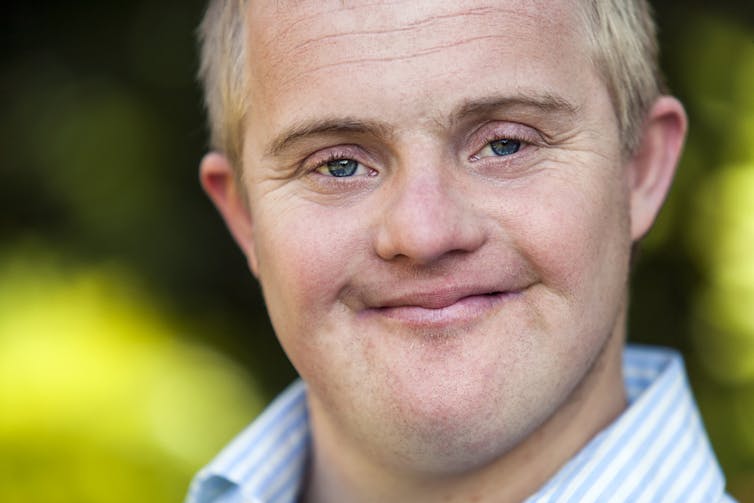People with Down syndrome have a very high risk of getting Alzheimer’s disease compared with the general population. Despite the increased risk, we don’t know enough about how the disease develops in this group to be able to conduct trials for new treatments. Our latest study has identified important information that could help to plan future trials.
Around one in every 1,000 people born in the UK have Down syndrome. Down syndrome is a genetic condition, and people with this condition have extra copies of some genes.
One gene where people with Down syndrome have an extra copy is called the amyloid precursor protein gene, or APP gene. This gene produces amyloid proteins. Clumps of these amyloid proteins have been implicated in the development of Alzheimer’s disease – the most common form of dementia – as they are found in great numbers in the brains of people with Alzheimer’s.
Most people with Down syndrome also have these clumps of amyloid protein in their brains from their mid-30s. This is thought to be due to their extra APP gene. The presence of these amyloid clumps in people with Down syndrome is thought to be linked to the greatly increased risk of developing Alzheimer’s disease in this population.
Alzheimer’s diagnosis also occurs at a much younger age in people with Down syndrome compared with the general population. Recent studies have estimated that the risk of being diagnosed with dementia is 80% by the age of 65 for people with Down syndrome, and the average age of dementia diagnosis is 55 years.
We have shown that Alzheimer’s disease is the underlying cause of death in 70% of people with Down syndrome who die after the age of 35. Also, mortality rates are five times higher for people with dementia compared with those who do not have dementia. These figures show the importance of finding new treatments for Alzheimer’s disease in people with Down syndrome.
To develop drug trials for Alzheimer’s disease in Down syndrome it is necessary to understand the earliest symptoms that occur as the disease develops. Previously, it was not clear whether the memory changes typical of Alzheimer’s disease in the general population are also the first changes in people with Down syndrome and, if so, when these changes begin.
Our study, carried out at King’s College London and University College London, answered these questions. We tested different abilities of over 300 people with Down syndrome with a wide age range (16-71 years), including people with different stages of dementia.
We found that the earliest cognitive changes using our tests were in memory and attention, and these changes started in the early 40s.

Enough information to get started
Previous drug trials for Alzheimer’s disease have had limited success. Researchers think this is because treatments are given when the disease has progressed too far. Because Alzheimer’s disease is so common in people with Down syndrome, understanding the early changes will allow treatment to be started before symptoms have developed.
As a result of our findings, we now know which cognitive tests will be most sensitive at detecting the earliest brain changes. We also know at what age trials should be started for this, and the number of people needed for such a drug trial.
Successful trials to treat Alzheimer’s disease in people with Down syndrome may help to identify new drugs that could treat Alzheimer’s disease in the general population. Over 50m people are estimated to have dementia across the world, and this number is expected to triple by 2050. Finding treatments for Alzheimer’s is essential to tackle this burden.

